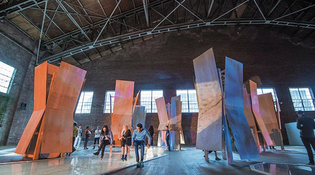 loading
loading
New HavenNew Haven’s artistic OktoberfestOne month. 450 artists. 10,000 people viewing new art.  Kirk DonaldsonA team of Yale architecture students created garden-pleasure (above) for City-Wide Open Studios in 2017. The installation at the New Haven Armory included seven booths, each enclosing a mythical garden. Artspace New Haven, which commissioned the work, describes each garden as a “haven, allowing for reflection and mass interpretation.” View full image“You put something like this up in a gallery in Iran, and you go to prison.” Dariush Rose gestured behind himself, at a ceramic artwork featuring sewn lips and blindfolded faces. It’s called Democracy in Iran. We were in the New Haven Armory, a space that’s vacant almost all year long. But for one weekend last October, it hosted City-Wide Open Studios (CWOS), an arts festival held every fall by Artspace—a local nonprofit—and partially sponsored by Yale. Rose was one of almost 200 artists exhibiting in the building, and one of about 450 who exhibited during the month-long event last year. Back in Iran, Rose was a successful artist. Galleries would buy his entire collection; he was featured, twice, at the Tehran Museum of Contemporary Art. But before he could show his pieces, the infamous Ministry of Culture and Islamic Guidance had to approve them. Political statements were forbidden. So Rose left the art world and became a chef. A few years later, he also left Iran. Now based in Connecticut, Rose sees CWOS as an opportunity to showcase his work. He showed in a room adjacent to an amateur photographer who is a pediatrician at Yale New Haven Hospital. Down the hall, a woman in her 60s displayed watercolors, next to charcoal sketches by a Syrian refugee. In the cavernous main drill hall, a team of architecture students installed a large-scale sculpture. Every October, CWOS features works in nearly 50 different locations, chosen to highlight under-visited parts of the city: galleries and studios in Westville; private studio spaces scattered around New Haven, Hamden, and West Haven; and the festival’s cynosure—a multi-exhibit weekend in a large vacant space. From 2013 through 2017, that weekend took place in the 150,000-square-foot Armory, on Goffe Street next to the New Haven Correctional Center. Last year, 10,000 people visited CWOS. Twenty-one years ago, when the festival began, 10,000 would have sounded absurdly ambitious to its founders. But New Haven has changed. Quickly. In the past ten years, more than half a dozen luxury apartment buildings have been built. There’s a new L. L. Bean flagship store near Elm and York. That revitalization may not affect all communities equally. Twenty-six percent of New Haveners live below the poverty line. But by reaching out broadly and showcasing in abandoned, unvisited spaces, Artspace and CWOS are working hard to touch all of New Haven, not just the affluent neighborhoods. Helen Kauder, executive director of Artspace, estimates that over the years CWOS has turned more than 3 million square feet of unused space into useful space, even if briefly. The Armory won’t be used this October. The roof needs major repairs. The marquee event will be hosted in a vacant building on Yale’s West Campus, next to the School of Nursing, at the end of October. That’s appropriate: this year’s festival is themed “Well-Being.” Pieces will include a collection of theater works from artists that explores “the stigma of mental illness in low income communities of color”; an installation titled Conversion Therapy, about the violence queer youth face. As for Rose, when he and his family immigrated in 2010 as refugees, he was thrilled. In America, he was finally free to make art. “I started to express myself in ways that I couldn’t” in Tehran, he says. But in America, the successful artist ran into a problem he’d never faced before: finding buyers. Rose now owns a catering business in Southington. He’s still creating and was recently featured at the New Haven Museum. He remains grateful for CWOS. It’s still a wonder to be able to show whatever work he wants.
The comment period has expired.
|
|